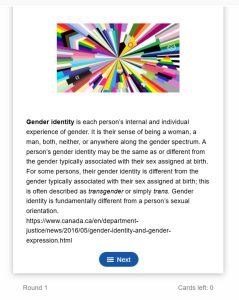2 Chapter 2 (Complete)


Make a note of anything that surprised you in this episode or something new that you learned:
- First of all, I was surprised by how Olympic announcers did not know how to say Max’s name. Prior to university, I was at Durham College taking Journalism Mass Media. We learned over and over the importance of knowing someone’s name and pronouns. The fact that hosts/journalists hired for this calibre of an event and don’t do their proper research is shocking.
- I was surprised by female athletes being forced to be naked to be inspected by doctors. The nude parades remind me of prison searches. It must have felt like they were criminals, significantly ‘othered’. In the case of Max, They didn’t even tell Max why they were doing it which would have been very stressful as well. It was crazy to me that her manager told her about the results, rather than the doctor. Regardless of why people undergo medical testing, I think it is only ethical that the patients should be contacted first for fairness and confidentiality.
- I was surprised to hear about the certificates of femininity and how every woman was tested. It’s sad that they were instilled with fear and worry over this DNA testing. It is crazy to think that women are losing their social status, friends, partners, career all at once from learning that they have mixed chromosomes. This being what happened to the case of Maria.
- I was surprised that gender verification was finally dropped, after 30 years of health professionals and athletes advocating… but only for 10 years. Even though not every woman had to be tested, it is still awful that it was not completely eradicated as testing could still take place based on suspicion.
What would I add to this timeline:
I would add the case of Maria Jose-Martinez Patino (from the podcast), because she was an example of how women with both x and y chromosomes learned about their conditions from gender verification testing. She lost almost everything in her life due to this on top of the fact she had to face the news that she had androgen sensitivity.
Has the gendering of sport ever been a constraint on your involvement? How? Or, if not, why do you think this is?:
Yes, I do feel that the gendering of sports has been the main constraint on my lack of involvement in sports. Growing up my mom definitely gatekeeped me from partaking in activities and hobbies which were inherently perceived as ‘masculine’, which my brothers got to experience. For example, my brothers were signed up to play hockey, as I was enrolled in dance like ballet, tap and jazz. I don’t think this was completely intentional, rather a subconscious decision based on how we are all programmed about gender from birth. I am sure if I pleaded to play hockey or get a video game console like my brothers, she would have listened. Although, I think I didn’t know what I was missing out on. I ended up wanting to quit dance because I found it boring, which leads me to believe that I could have really enjoyed playing a sport. Particularly one which was more physically demanding or somewhat aggressive at times like hockey. Additionally, I think it also would have benefitted the relationships I had with my brothers because we never had any common interests or hobbies.
briefly discuss in two or three sentences how these responses and the polling figures in general confirm or contradict your assumptions about gender-coding and sports. Did anything surprise you?
The polls did seem to reflect my own opinions, rather than contradict them. I was surprised to see that about 9% of the class thinks that rugby is a female dominated sport and 30% of the class thinks that rugby is gender neutral. I have never heard of female rugby teams before- from friends or the media; and my high school only had a male rugby team. Also, physically demanding but less aggressive types of sports were mostly deemed as gender neutral like swim, dance and tennis.
In a longer version of the interview excerpted in the video above, Lia Thomas states “Trans women competing in women’s sports does not threaten women’s sports as a whole because trans women are a very small minority of all athletes and the NCAA rules around trans women competing in women’s sports have been around for 10+ years and we haven’t seen any massive wave of trans women dominating”? Do you agree with this statement? See also the image above suggesting that the issue may be overblown by politicians and influencers who don’t actually care that much about women’s sports. Please share any thoughts you have in your Notebook by clicking on the audio button or writing a few sentences:
I most definitely agree with Lia Thomas’s statement and support her in her sports career. Trans athletes make up such a little percent of all athletes, yet manage to cause such a commotion- even when they aren’t winning. The ESPN video featuring Lia’s fellow competitor Reilly Gaines was very telling. Reilly said she did not want to be viewed as a bigot- then blatantly said she doesn’t think trans women are women and using their pronouns goes against her moral compass. She clearly is a transphobic bigot and because of that her opinion is bound to be rooted in personal bias rather than facts. I would also like to add how Lia and Reilly tied- it is not like Lia blew her out of the water completely the way republicans seem to claim. As Lia said as well, she transitioned to live authentically to herself, not to bypass competing against men.
What does the host and writer, Rose Evereth, have to say on the issue of unfair advantage? Can you think of other examples of unique biological or circumstantial advantages from which athletes have benefited enormously that have nothing to do with gender? Note these in your Notebook.
Rose Evereth has to say that unfair advantage in sports is stemmed from levels of testosterone. The ‘unfair advantage’ can also apply to dozens of other genetic mutations, which can make one more likely to perform better. Meanwhile, these are never discussed or of focus in comparison to testosterone. Sports aren’t divided by genetic factors, but rather sex. It proves that regulations only occur when it is in efforts to suppress transgender athletes from playing. Some other unique biological circumstances unrelated to gender can be weight or height. Although, this is held against trans athletes and women who seem to appear as too ‘masculine’. In male sports, people don’t care that a smaller man may be less capable than a large man. As mentioned in the podcast episode as well, mental strength and determination may give athletes an upper hand in pushing through difficult activities. I also think about the access to different resources which rely on financial status like coaching or diets. This would place wealthier athletes at a higher advantage by receiving the best assistance in training for sports.
What does Robins mean when she argues that: “The aims of transvestigation of an Olympic athlete are not, in any meaningful sense, anything to do with sports, or fairness, or even with women (cis women, at least) as a social category. Rather, they have everything to do with transness, and the public expression of trans femininity. For my money this has never been about sport. What it has always been is an excuse to publicly relitigate the existence of trans women.” Make a note in your Notebook:
I feel that Robins means that the trans-hysteria happening within the sports field has nothing to do with sports, or about protecting the fairness of cisgendered women. Instead it is purely stemmed in prejudice towards trans people, particularly trans women since it is easy to claim they are at a physical advantage. There is a grand narrative being pushed within these arguments that being trans is wrong and will be a struggle should trans people live their truth and transition. The discrimination has gotten to the point that even cis-gendered women like Imane Khelif are being attacked online for not appearing as feminine enough for the male gaze. Cisgendered women are expected to be hyper feminine, while trans-women are discouraged from being any bit feminine in the public eye. These hateful comments mentioned in the article proves that transphobia is out of hand and all of these opinions are completely biased. Ultimately, Robins is speaking to the suppression of trans-women as the fundamental reason for the anti-trans campaigns within sports.
Please note that Assignment 1 will be placed in the BlackBoard DropBox, rather than here in the Notebook. Also that I was granted an extension until Friday February 21st. Thanks!
Media Attributions
- completed card flip
- contributionofpadletpolls
